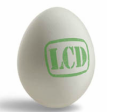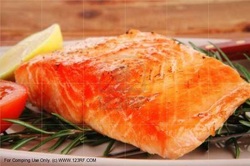Seafood: Keeping It Healthy and Sustainable
Recently, however, I read a great Newsweek article that left me thoroughly depressed about our overfished waters.
While I knew that many popular types of fish — including red snapper, swordfish, and Chilean seabass — were close to being endangered, I had no idea of the extent of the problem. We’re truly in danger of running out of many types of fish if we keep going at our current pace. The changes in marine life populations are creating a huge amount of stress on our delicate ocean ecosystems.
Another issue is the mercury content of seafood. Mercury has profoundly negative effects on the body at toxic levels, including kidney damage, memory impairment, and neurological symptoms such as lack of coordination and pain or loss of sensation of the extremities. Although mercury poisoning is especially of concern for pregnant women, it can occur in anyone who eats a lot of seafood high in mercury. In general, the fish that contain the most mercury are larger varieties like shark, swordfish, orange roughy and, unfortunately for me, Ahi tuna. In addition to mercury, there’s cause for concern over fish contaminated by other heavy metals as a result of Japan’s nuclear plant damage following the devastating earthquake and tsunami last year.
Sprout and Press has an excellent free, downloadable pocket guide to make choosing seafood easier. However, it’s not always easy to determine exactly where the fish you’re eating came from, and as you can see from the guide, fish such as salmon range from “best choice” to “avoid” based on where they originate and whether they are wild or farmed. Some farmed fish are actually better than fresh-caught, but not salmon. Confusing, isn’t it?
How do we choose fish that are both environmentally friendly and healthy? Selecting small fish is a good start. Sardines, herring, shrimp, and most non-farmed salmon are low in mercury, sustainable, and highest in omega 3 fats. Fish that are not as high in omega 3’s but still good choices include flounder, sole, squid, farmed tilapia, and farmed trout. All canned salmon is wild-caught. It’s something I eat often and recommend to my patients as an inexpensive source of high-quality protein and healthy fat. Sardines and herring are other excellent canned fish choices.
Seafood has a lot of things going for it, but it’s important to make the right choices. I still recommend eating fish three times a week but hope to do so in a way that makes sense from both an environmental and health perspective.
If you haven’t tried sardines or herring in a while — or ever — why not give them a try? I think you’ll be surprised how delicious they can be. And if you end up not liking them, I’m willing to bet you can find a grateful cat (or family member) who’d be happy to take them off your hands.


That was a great article! Thank you! Although I do not eat sea food because of my vegetarian lifestyle, I also give the recommendation to consume seafood 2 times a week to my patients. I have been increasingly concerned about the endagerment of our oceans too and now I know the best fish to recommend from both a health and environmental perspective.
Thanks so much, Gina! Glad you found the information helpful. I really like the pocket guide and appreciate that a separate one was created for each geographical region.
As your mom I don’t always agree with you on every topic, but when it comes to diet and nutrition my motto is: “Franziska knows best.” I will try to follow your advice and eat more of the healthy fish varieties.
Thanks, Mom! 🙂
Hi Franziska,
I enjoyed the post.
I struggle with seafood; not from a health perspective, but due to a strong, lifelong aversion to any “fishy” flavor. However, over the years I’ve learned that I can enjoy those fish which don’t have a lot of oil in their flesh (and, of course, that are “fresh”). I do love shrimp and lobster, but am aware that those critters don’t really fit into a low cholesterol diet. Bummer…
Thanks for reminding me to keep some kind of fish on my home menu!
NurseBob
Thanks, Bob! You’re certainly not alone in not liking “fishy” fish. So sardines really aren’t your thing, then 😉 Glad there are some types of seafood that you find palatable. Shrimp and lobster are fairly high in cholesterol, but dietary cholesterol has less of an impact on heart health than previously thought. They’re also low in calories and rich in iodine, so feel free to enjoy them occasionally.
Very valuable and useful article.I will give information regarding this to my friends.
Thanks for posting it.